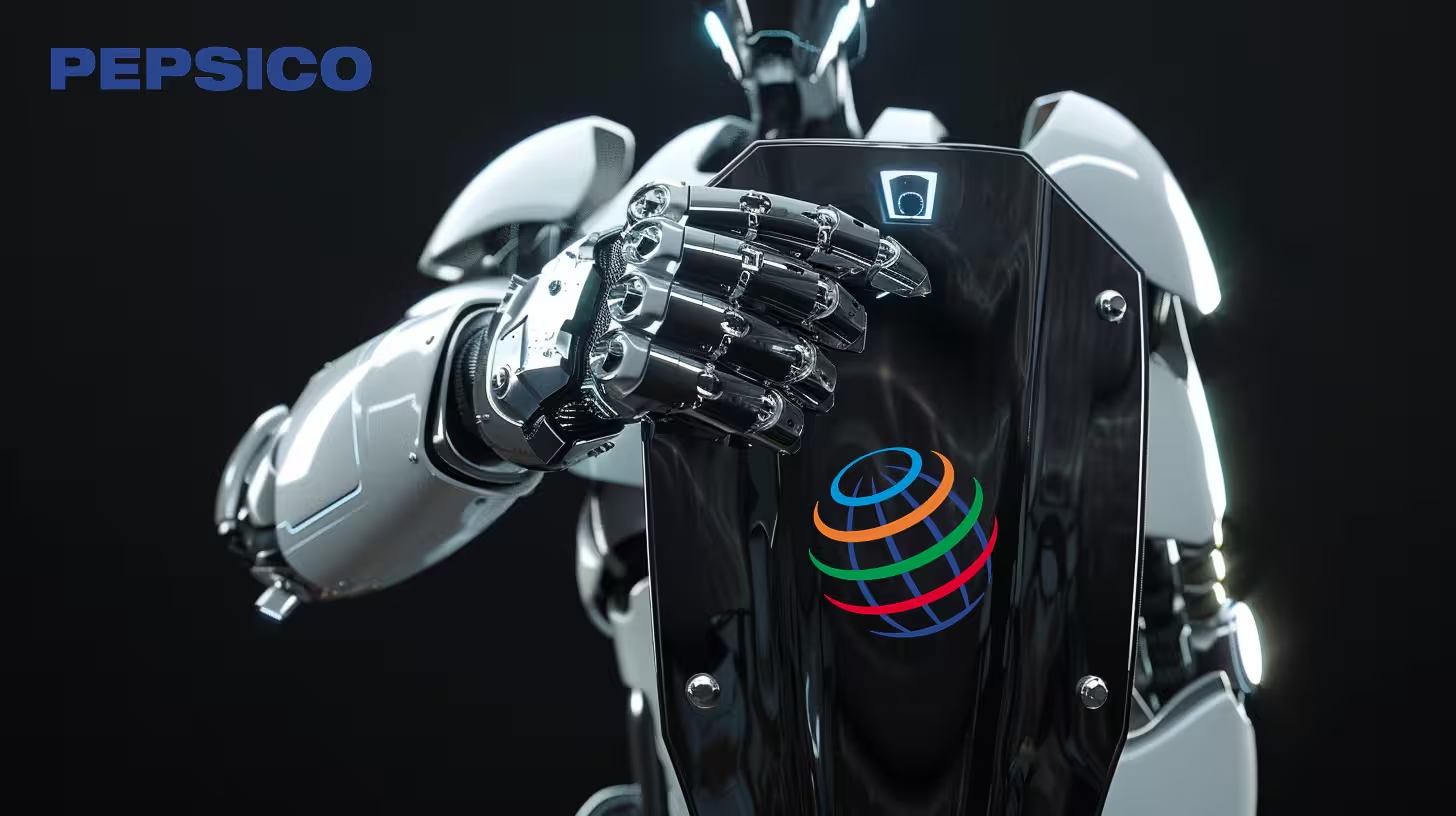76
How PepsiCo Uses Responsible AI to Boost Employee Productivity

Introduction
Responsible AI has become crucial in boosting employee productivity, especially during the rapid digital transformation organizations are experiencing. Large companies are now turning to artificial intelligence not just to make their operations more efficient, but also to ensure that the adoption of technology follows ethical guidelines and earns the trust of their workforce.
AI Transformation in HR Functions
- AI technology is fundamentally reshaping HR functions in large corporations by automating workflows, personalizing experiences, and enabling data-driven decisions.
- The convergence of responsible AI and employee productivity signifies a significant change. Automation offers efficiency but raises issues of fairness, transparency, and human oversight. Resolving these concerns is crucial to fully benefit from AI-powered HR tech transformation.
PepsiCo stands as a compelling case study in this space. The company’s global HR organization has invested in Responsible AI frameworks—prioritizing ethical design, governance, and accountability from the outset. With an ambitious vision for digital HR transformation, PepsiCo has embedded generative AI solutions into core processes such as recruitment, performance management, and employee support services. These initiatives are designed not only to boost productivity but also to preserve human judgment and foster a culture of trust.
This article explores how PepsiCo’s approach demonstrates that responsible AI is indispensable for enhancing productivity while safeguarding employee interests. Examining their strategy reveals actionable insights for leaders seeking to harness AI technology without compromising on ethical standards or business results.
The Evolution of AI in PepsiCo’s HR Landscape
AI evolution at PepsiCo HR
PepsiCo has long recognized the potential of AI to revolutionize its HR department. Initially, the company implemented basic AI tools to streamline repetitive tasks such as payroll processing and employee data management. These early efforts were foundational, setting the stage for more advanced AI technologies.
Generative AI tools like ChatGPT
Introducing generative AI tools like ChatGPT marked a significant milestone in PepsiCo's HR transformation. ChatGPT, with its natural language processing capabilities, has been instrumental in enhancing various HR workflows. For instance, HR professionals now leverage ChatGPT for drafting communications, generating reports, and providing instant responses to employee queries. This adoption not only increased efficiency but also allowed HR teams to focus on more strategic initiatives.
Transition to AI-driven solutions
PepsiCo's transition from traditional HR processes to AI-driven solutions reflects a commitment to responsible technology use. While automating routine tasks, the company ensures that human oversight remains integral to decision-making processes.
This deliberate integration of AI positions PepsiCo as a responsible leader in corporate HR technology.

Driving Employee Productivity Through Responsible AI Applications
PepsiCo’s strategic deployment of responsible AI has redefined the employee experience, unlocking new levels of productivity and efficiency across HR operations. By embedding generative AI capabilities within core HR processes, the company empowers its workforce with intelligent support tools that streamline daily tasks and eliminate unnecessary administrative burdens.
Conversational Chatbots and Agentic AI in Transactional HR
Conversational chatbots built with advanced natural language processing manage routine inquiries—such as payroll questions, leave balances, or travel policy details—with speed and accuracy. Agentic AI systems go further by initiating and completing multi-step processes autonomously:
- Employee self-service: Staff can update personal information, submit leave requests, or resolve basic IT issues without waiting for human intervention.
- HR ticket triage: Bots categorize and route complex requests to appropriate teams for faster resolution.
Automated Performance Management
Responsible AI transforms performance management by delivering data-driven insights tailored to individual profiles:
- Objective suggestions: AI analyzes historical performance data and recommends SMART goals aligned with business priorities.
- Continuous feedback loops: Automated systems prompt managers for timely feedback, ensuring continuous growth.
These applications reflect PepsiCo’s commitment to driving employee productivity with responsible AI, ensuring technology acts as an enabler—freeing human talent to focus on innovation and strategic decision-making.
Responsible AI in Talent Acquisition and Recruitment Processes at PepsiCo
PepsiCo has transformed its talent acquisition process by integrating AI-powered tools. These tools optimize pre-screening algorithms and CRM matching, making recruitment processes more efficient. With the help of these advanced technologies, HR teams can quickly go through a large number of applications and accurately identify the best candidates.
Streamlining Communication with AI
AI-driven text-to-engage components facilitate initial communication with potential hires, ensuring prompt and relevant interactions. To maintain fairness, PepsiCo employs one-way video interviews reviewed by human evaluators. This hybrid approach combines the efficiency of AI with the critical oversight of human judgment, preserving a balanced and equitable recruitment process.
Combating Bias with Human Oversight
To ensure fairness throughout the recruitment process, PepsiCo has implemented measures to prevent bias. These measures include establishing guardrails to mitigate bias in the recruitment pipeline and integrating human oversight at important stages to ensure ethical compliance.
Upholding Ethical Standards
PepsiCo's commitment to responsible AI use is evident in its efforts to create a transparent and fair environment for all candidates. By using AI in a responsible manner, PepsiCo is able to attract and retain top talent while also maintaining ethical practices.
This combination of advanced technology and human oversight demonstrates PepsiCo's dedication to finding innovative yet responsible solutions in HR.
Balancing Technology Adoption with Practical ROI and Business Alignment in HR Tech Transformation
PepsiCo approaches HR technology transformation with a disciplined lens, prioritizing both business alignment and measurable outcomes. The company’s strategy centers on leveraging robust, integrated SaaS providers such as Oracle to harmonize core HR processes globally. This preference for comprehensive suites creates a consistent data backbone and simplifies governance—key requirements for global enterprises navigating regulatory complexity and workforce diversity.
At the same time, PepsiCo maintains a pragmatic openness to niche, best-of-breed solutions that deliver clear ROI or fill capability gaps not addressed by larger platforms. Each new technology adoption is evaluated against strict criteria:
- Alignment with business objectives and HR strategy
- Demonstrated, quantifiable impact on productivity or employee experience
- Integration compatibility with existing SaaS infrastructure
Decision-makers emphasize agility without succumbing to the temptation of pursuing every emerging tech trend. The company pilots innovative tools through tightly scoped proof-of-concept projects before committing to wider rollout. This staged approach allows PepsiCo to validate outcomes—such as improved efficiency or enhanced user adoption—in a controlled environment, minimizing risk while accelerating learning cycles.
However, the challenge of aligning technology adoption with practical ROI does not solely rest on the shoulders of HR leaders. It also requires collaboration with other business units, including finance and operations, to ensure that the chosen technologies align with broader business objectives.
Strategic adoption blends the reliability of established platforms like Oracle with the innovation of targeted solutions, always anchored by tangible business value rather than speculative hype. This methodology ensures that HR tech investments drive real productivity gains while remaining aligned with PepsiCo’s operational priorities and workforce needs.
Enhancing Human Potential While Preserving Human Judgment Through Responsible Frameworks in HR Tech Transformation at PepsiCo
PepsiCo’s adoption of human-centric AI is grounded in the philosophy that artificial intelligence should amplify—never replace—human expertise, especially within HR. The company’s responsible AI framework ensures that technology serves as an augmentation tool, equipping HR professionals with actionable insights and recommendations while reserving critical decision-making for people.
AI as an Augmentation Tool
Generative AI applications, such as co-pilot systems, provide HR teams with curated data analyses, objective suggestions, and learning path recommendations tailored to individual employee profiles. These tools streamline complex processes but stop short of making autonomous personnel decisions. By positioning AI as a “co-pilot” rather than a “pilot,” PepsiCo maintains human agency and accountability at every stage of the talent lifecycle.
Safeguarding Critical Human Roles
To address concerns about automation displacing essential HR functions, PepsiCo’s governance model includes clear boundaries on where and how AI is applied.
- Transparent audit trails document every AI-driven recommendation.
- Mandatory human-in-the-loop checkpoints guarantee that final judgments—such as promotions, disciplinary actions, or terminations—remain under direct managerial control.
- Continuous training empowers HR leaders to leverage AI responsibly, sharpening their own analytical skills while ensuring technology augments rather than overrides human judgment.
By embedding these practices into standard operating procedures, PepsiCo exemplifies Driving Employee Productivity with Responsible AI: Inside PepsiCo's HR Tech Transformation—demonstrating how robust frameworks can unlock workforce potential without compromising ethical standards or employee trust.
Insights and Future Outlook of Responsible AI in HR Transformation
PepsiCo demonstrates how responsible AI practices can be easily integrated into regular HR processes—improving employee productivity while maintaining ethical standards and fostering trust. The case study, Driving Employee Productivity with Responsible AI: Inside PepsiCo's HR Tech Transformation, emphasizes how strong governance frameworks can unleash the potential of the workforce.
In this section, we examine the changing role of AI in HR functions and its wider impact on achieving sustainable success in organizations.
Conclusion
Responsible AI is key to boosting employee productivity by incorporating ethical and transparent practices into every aspect of AI technology implementation. Organizations that embrace these principles empower their employees, automate repetitive tasks, and enable more valuable contributions—all while maintaining integrity and human oversight.
PepsiCo’s HR tech transformation showcases the tangible benefits of Responsible AI. By combining advanced generative AI tools with strong governance and clear ethical guidelines, PepsiCo has improved workflows, decreased administrative burdens, and empowered teams to concentrate on strategic initiatives that influence business outcomes.
"PepsiCo was one of the first organizations to really embrace responsible AI and develop a framework very early on. We've since embedded it across the company—with clear policies, governance, and human-centric principles that guide how we implement AI today." — Mark Sankarsingh, VP People Solutions, PepsiCo
Creating an environment where AI technology supports rather than replaces human decision-making strengthens organizations. Employees thrive in a workplace characterized by fairness, transparency, and equal opportunity—essential factors for long-term engagement and retention.
As large companies seek to replicate this model, adopting Responsible AI becomes not just a technical decision but a leadership necessity. The way forward involves combining state-of-the-art innovation with solid ethical principles to build workplaces where productivity flourishes alongside trust.

Continue Reading













